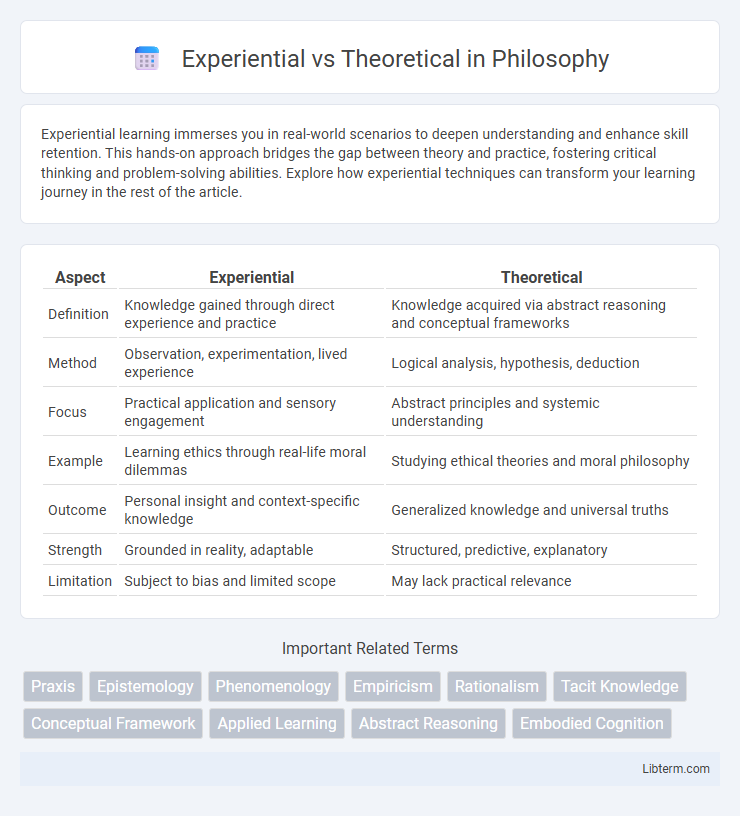Experiential learning immerses you in real-world scenarios to deepen understanding and enhance skill retention. This hands-on approach bridges the gap between theory and practice, fostering critical thinking and problem-solving abilities. Explore how experiential techniques can transform your learning journey in the rest of the article.
Table of Comparison
| Aspect | Experiential | Theoretical |
|---|---|---|
| Definition | Knowledge gained through direct experience and practice | Knowledge acquired via abstract reasoning and conceptual frameworks |
| Method | Observation, experimentation, lived experience | Logical analysis, hypothesis, deduction |
| Focus | Practical application and sensory engagement | Abstract principles and systemic understanding |
| Example | Learning ethics through real-life moral dilemmas | Studying ethical theories and moral philosophy |
| Outcome | Personal insight and context-specific knowledge | Generalized knowledge and universal truths |
| Strength | Grounded in reality, adaptable | Structured, predictive, explanatory |
| Limitation | Subject to bias and limited scope | May lack practical relevance |
Understanding Experiential and Theoretical Approaches
Experiential approaches emphasize learning through direct experience, allowing individuals to engage actively with real-world situations for deeper comprehension and skill development. Theoretical approaches focus on understanding concepts and principles through abstract reasoning and structured frameworks, providing a foundation for critical analysis and application. Combining experiential and theoretical methods enhances cognitive retention and practical problem-solving by linking hands-on practice with conceptual knowledge.
Key Differences Between Experiential and Theoretical Learning
Experiential learning emphasizes hands-on, practical involvement, allowing learners to engage directly with real-world scenarios, which enhances retention and skill application. Theoretical learning focuses on abstract concepts, principles, and frameworks, providing a foundation of knowledge through reading, lectures, and discussion. Key differences lie in the active participation of experiential learning versus the passive reception of theoretical learning, with experiential methods fostering critical thinking and problem-solving abilities more effectively.
Benefits of Experiential Learning
Experiential learning enhances retention and understanding by engaging learners in hands-on activities that simulate real-world scenarios, fostering practical skill development. It promotes critical thinking, problem-solving, and adaptability by allowing learners to apply concepts in dynamic environments, leading to deeper cognitive connections than theoretical instruction alone. This approach also increases motivation and confidence, essential factors in effective long-term learning outcomes and professional growth.
Advantages of Theoretical Knowledge
Theoretical knowledge provides a strong foundation of principles and concepts essential for understanding complex subjects systematically. It allows for the development of critical thinking and problem-solving skills through analysis and abstraction. This type of knowledge facilitates innovation and adaptation by offering a broad framework that can be applied across various practical scenarios.
Real-World Applications of Experiential Methods
Experiential learning emphasizes hands-on, real-world applications that enhance skill acquisition through direct experience rather than abstract theory. This approach fosters critical thinking and problem-solving abilities by immersing learners in authentic scenarios, leading to deeper understanding and retention. Industries such as healthcare, engineering, and business increasingly adopt experiential methods to prepare professionals for practical challenges and dynamic environments.
Limitations of Theoretical Approaches
Theoretical approaches often face limitations such as reliance on assumptions and models that may not fully capture real-world complexities, leading to potential inaccuracies in predictions. These approaches can lack practical context and fail to account for variables that emerge only through direct experience or experimentation. Consequently, purely theoretical methods may provide incomplete insights without the empirical validation that experiential data offers.
Integrating Experiential and Theoretical Techniques
Integrating experiential and theoretical techniques enhances learning by combining hands-on practice with foundational knowledge, fostering deeper understanding and skill application. Experiential methods, such as internships or simulations, provide real-world contexts where theoretical concepts can be tested and refined. This synergy improves critical thinking, problem-solving abilities, and retention of information across disciplines like education, psychology, and professional training.
Case Studies: Experiential vs Theoretical Success Stories
Case studies highlighting experiential success often showcase real-world application and adaptive problem-solving, emphasizing practical outcomes derived from hands-on involvement. Theoretical success stories, by contrast, underscore predictive models and hypothesis-driven insights, relying heavily on data analysis and conceptual frameworks. Comparing these cases reveals a balance between experiential learning's contextual understanding and theoretical approaches' systematic rigor, informing best practices across industries.
Choosing the Right Approach for Your Goals
Selecting the right approach between experiential and theoretical learning depends on your specific goals and context. Experiential learning enhances practical skills and real-world problem-solving through hands-on activities, making it ideal for careers requiring immediate application. Theoretical learning builds foundational knowledge and critical thinking, which is essential for academic research and in-depth understanding of complex subjects.
Future Trends in Experiential and Theoretical Education
Future trends in experiential education emphasize immersive technologies like virtual and augmented reality to enhance hands-on learning, promoting skill development and real-world problem-solving. Theoretical education is increasingly integrating data analytics and AI-driven personalized learning paths to deepen conceptual understanding and adapt to individual student needs. Blending these approaches will create hybrid models that optimize engagement and knowledge retention in evolving educational landscapes.
Experiential Infographic

 libterm.com
libterm.com